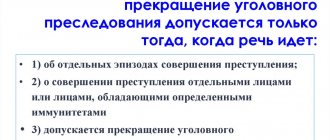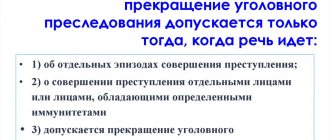Article 158 of the Criminal Code of the Russian Federation. Theft (current edition)
1. Theft, that is, the secret theft of someone else’s property, -
shall be punishable by a fine in the amount of up to eighty thousand rubles, or in the amount of the wages or other income of the convicted person for a period of up to six months, or by compulsory labor for a term of up to three hundred sixty hours, or by corrective labor for a term of up to one year, or by restriction of liberty for a term of up to two years. , or forced labor for a term of up to two years, or arrest for a term of up to four months, or imprisonment for a term of up to two years.
2. Theft committed:
a) by a group of persons by prior conspiracy;
b) with illegal entry into the premises or other storage;
c) causing significant damage to a citizen;
d) from clothes, bags or other hand luggage that were with the victim -
shall be punishable by a fine in the amount of up to two hundred thousand rubles, or in the amount of the wages or other income of the convicted person for a period of up to eighteen months, or by compulsory labor for a term of up to four hundred eighty hours, or by corrective labor for a term of up to two years, or by forced labor for a term of up to five years. with restriction of freedom for a term of up to one year or without it, or imprisonment for a term of up to five years with restriction of freedom for a term of up to one year or without it.
3. Theft committed:
a) with illegal entry into a home;
b) from an oil pipeline, oil product pipeline, gas pipeline;
c) on a large scale;
d) from a bank account, as well as in relation to electronic money (in the absence of signs of a crime provided for in Article 159.3 of this Code) -
shall be punishable by a fine in the amount of one hundred thousand to five hundred thousand rubles, or in the amount of the wages or other income of the convicted person for a period of one to three years, or by forced labor for a term of up to five years with or without restriction of freedom for a term of up to one and a half years, or imprisonment for a term of up to six years with a fine in the amount of up to eighty thousand rubles or in the amount of the wages or other income of the convicted person for a period of up to six months or without it and with restriction of freedom for a term of up to one and a half years or without it.
4. Theft committed:
a) an organized group;
b) on an especially large scale, -
shall be punishable by imprisonment for a term of up to ten years with or without a fine in the amount of up to one million rubles or in the amount of the wages or other income of the convicted person for a period of up to five years and with or without restriction of freedom for a term of up to two years.
Notes. 1. In the articles of this Code, theft refers to the illegal gratuitous seizure and (or) conversion of someone else’s property for the benefit of the perpetrator or other persons, committed for mercenary purposes, causing damage to the owner or other holder of this property.
2. Significant damage to a citizen in the articles of this chapter, with the exception of part five of Article 159, is determined taking into account his property status, but cannot be less than five thousand rubles.
3. In the articles of this chapter, premises are understood as buildings and structures, regardless of the form of ownership, intended for the temporary residence of people or the placement of material assets for production or other official purposes.
In the articles of this chapter, storage means utility premises separated from residential buildings, areas of territory, pipelines, and other structures, regardless of the form of ownership, that are intended for permanent or temporary storage of material assets.
4. In the articles of this chapter, with the exception of parts six and seven of Article 159, Articles 159.1 and 159.5, large size is recognized as the value of property exceeding two hundred and fifty thousand rubles, and especially large - one million rubles.
Examples of attempted theft
Let's look at a few typical examples of attempted theft of someone else's property.
Attempted shoplifting
We can safely say that theft in large chain stores is the most common in our time. Despite modern methods of protection in supermarkets, the organization of serious security of trading floors, the presence of video surveillance, thefts are committed there every day by tens and hundreds.
A considerable number of them are also stopped in these places precisely at the stage of the assassination attempt.
Example. Citizen Ya came to the Lenta hypermarket, hid a couple of sticks of sausage under his clothes, put a bottle of cognac in his jacket pocket, and put sweets and chocolate in his jacket pockets. When approaching the cash registers, Ya. was stopped by the store security guard and taken to the back room, where police officers were called to document the situation.
Having recalculated the cost of the goods that Ya tried to steal, the amount was established at 3 thousand rubles. Ya. honestly admitted to the police that he had the intention of taking goods from the store without paying, but was noticed and stopped by a security guard.
Y. was unable to use the stolen property and dispose of it at his own discretion due to circumstances beyond his control (he was detained by security). Subsequently, Ya. will be charged under Part 1 of Article 158, Part 3 of Article 30 of the Criminal Code of the Russian Federation for attempted theft of someone else’s property.
Attempted theft of funds
Example. Citizens O. and S. agreed in advance to steal money from ATMs located in accessible places in the city at night, purchased the necessary equipment and a car. O. and S. entered one of the bank premises, where there were several ATMs. The method used to open ATMs was determined by the comrades to explode the terminal body and further confiscate the cassettes with money.
O. pumped gas into two ATMs and lit the fuse, a strong explosion occurred, from which O. was concussed and lost consciousness, S. left the bank premises and drove away. O. was detained at the scene of the crime by the arriving officers of the Russian Guard. The next day S. was also detained.
In the actions of O. and S., the investigative authorities can reasonably determine the corpus delicti under Art. 158 part 2, part 3 of article 30 of the Criminal Code of the Russian Federation – attempted theft of someone else’s property. In this case, the criminals could not even take possession of the money, but nevertheless they will bear criminal liability.
We can summarize briefly.
- If someone tried to commit theft and was unable to bring his actions to the desired conclusion not of his own free will, we will have - attempted theft.
- Despite the unfinished nature of the criminal act, the person who committed the attempt will be held criminally liable.
- An exception to these rules will be a voluntary refusal to commit a crime.
Types of punishment
The degree of responsibility is distributed depending on belonging to one of the parts of Art. 158 CC:
- the first is hidden theft;
- the second is a crime committed by a group or with entry into the premises, or causing significant damage, or from clothing and hand luggage;
- the third is theft when entering a home, either from an oil and gas pipeline, or from a bank account (including an electronic one), or on a large scale;
- the fourth is a crime committed by an organized community, or in an especially large amount or equivalent value.
Also read: What are the consequences for stealing up to 1000 rubles?
Depending on other circumstances, the amount of damage and the number of persons involved, the court may choose one of the forms of criminal punishment:
Type of criminal prosecution for theft under Article 158 of the Criminal Code of the Russian Federation
| Fine or recovery of income of the guilty person for the period | Up to 80 thousand rubles. | Up to 200,000 rub. | 100 – 500 thousand rubles. | — |
| Salary and other income for 6 months | All types of income for 1.5 years | Earnings from 1 to 3 years | — | |
| Mandatory work (in free time, the scope of work is established jointly with self-government bodies) | Up to 360 actual working hours | Up to 480 hours | — | — |
| Correctional labor (served at the place of primary employment with deduction of up to 25% from salary) | Up to 365 days | Up to 24 months | — | — |
| Restriction of freedom (prohibition on movement, visiting certain places and people) | Up to 24 months | Not provided | ||
| Forced labor (in places established by correctional authorities) with restriction of freedom | Up to 24 months | Up to 5 years | Up to 5 years | — |
| — | Plus 12 months limitation | Plus 18 months limitation (or without) | — | |
| Arrest (strict isolation from others, including at home) | Up to 4 months | Not provided | ||
| Imprisonment (with or without further restrictions) | Up to 2 years | Up to 5 years (plus 12 months limitation) | Up to 6 years, and in addition, a fine of up to 80,000 rubles (or earnings for six months with restriction of freedom for up to 18 months) | Up to 10 years plus a fine of 1 million rubles. (or recovery of income for 5 years with restriction of movement for up to 2 years) |
It must be taken into account that Article 158 of the Criminal Code can only be applied for theft that caused a loss of at least 2.5 thousand rubles.
Important! As required by law, the qualification of the significance of losses for the victim must be based on data on his actual income. In practice, the amount of damage is 5,000 rubles. in itself gives grounds to talk about significant harm.
Limitation periods
The statute of limitations for acts committed also varies depending on the type of crime.
Qualification of the act of the guilty person or group of persons The period for bringing to responsibility from the moment of commission
| The act provided for by the first part of Article 158 of the Criminal Code | No later than 2 years |
| Theft in the form provided for in Part 2 of Art. 158 CC | No later than six years |
| In accordance with parts 3 and 4 of the same norm | You can be punished for theft under Article 158 of the Criminal Code of the Russian Federation before the expiration of 10 years |
Classification of theft by the amount of damage caused
The severity of the crime is assessed, inter alia, depending on the value of the stolen property and the amount of damage caused during the seizure of the item. According to the Criminal Code of the Russian Federation, theft is classified as:
- small – up to 2,500 rubles;
- causing significant damage to the victim – from RUB 5,000;
- large – from 250,000 rubles;
- especially large ones - from 1,000,000 rubles.
Age of criminal responsibility
Any person who is 14 years old (at the time of the theft) can be prosecuted or sanctioned for actions falling under Article 158 of the Criminal Code of the Russian Federation. If a younger teenager is “foolish,” then his parents or legal guardians will have to answer for him.
In most cases, a set of measures will consist of:
- fine from 1,000 to 50,000 rubles;
- registering a “difficult teenager” with the police.
Other methods of suppressing the liberties of minors are described in Art. 88 of the Criminal Code. The most severe is imprisonment from 6 to 10 years for especially serious crimes. For less socially dangerous offenses (for example, theft), a teenager over 16 years of age can receive a punishment in the form of restriction of freedom for up to 24 months.
How to prosecute for attempted theft?
The procedure for bringing someone to justice for theft or attempted theft is quite simple.
Every detected case of theft or attempted theft must be reported to law enforcement agencies , and in particular to the nearest territorial police department. The message can be made in any way convenient for you: telephone, fax, message on the website, personal visit to the police.
After the message, the owner must write a statement in which he indicates when, where and who tried to steal your property, whether you have a suspect, and indicate without fail what damage was caused to you.
If you attempt to steal from a retail outlet, confirm the possible damage with documents (results of a documentary audit, a certificate of the value of the goods), ensure that security and store personnel are interviewed, and provide video surveillance recordings during the attempt.
The difference between theft and related compounds
When talking about the discovery of theft, the victim often calls the incident robbery, and the perpetrators - robbers. Meanwhile, these concepts have nothing to do with theft in the sense specified in the Criminal Code of the Russian Federation. Offenses of this kind are divided into:
- theft - at the time of the theft, the owner of the item does not know or suspect what is happening, and the criminal himself thinks that he is performing the manipulations unnoticed by others, regardless of the presence of witnesses in reality (Article 158 of the Criminal Code of the Russian Federation and comments given by the Plenum of the Supreme Court in Resolution No. 29);
- robberies are the same actions of a criminal, but the guilty person knows that his act is not a secret to others, Art. 161 CC;
- robbery - the taking of personal or common property using threats to life and health (including the use of any type of weapon), Art. 162 of the Criminal Code.
Also read: What is the difference between administrative liability and criminal liability: main similarities and differences
Moment of the beginning of the crime
In most cases, the circumstances of the theft do not cause difficulties in determining the time when the crime began. Conditionally, cases can be divided into:
- impulsive, when the onset of the crime coincides with the moment of direct seizure of a valuable item - the participant or group of participants does not personalize the object in advance and does not specify the type of property (street theft, theft with legal entry into a home, but without a prior plan);
- planned - in this case, even preparatory actions that are clearly aimed at committing theft (illegal entry into housing, preparing specific equipment, creating a group, etc.) will be considered a crime.
The very idea, planning and practical preparation for the seizure of someone else’s property cannot be considered stages of the theft itself. However, some of these actions (creating a stable group, purchasing or manufacturing equipment, duplicate keys, for example) fall under Art. 30 CC.
The end of the crime
It is also important when the act of the guilty person is considered a completed crime. In the case of theft, this is the moment when the item was taken from the owner. In the judicial practice of the Russian Federation, theft is considered completed if the situation meets several criteria at once:
- the seizure occurs secretly (without the presence of the owner of the property or in his presence, but without actual detection at the time of active actions);
- the item passes into the hands of the thief, after which he gets the opportunity to use the loot at his own discretion (store, sell or dispose of it personally);
- the seized item is clearly someone else’s (the thief did not have and was not supposed to have any rights to it);
- the offender left the scene of the theft and the property owner’s territory.
Practical example:
- the thief was detained by security at the exit from the store - the crime is not complete and will be classified as an attempt;
- the pickpocket was caught a few minutes after the purse was stolen from the bag - the completed act, depending on the amount stolen, will be considered as theft or petty theft.





